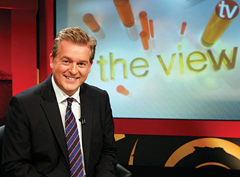Mark Carruthers: The View from where I’m standing
 Mark Carruthers reflects on his new role as presenter of BBC Northern Ireland’s television politics programmes.
Mark Carruthers reflects on his new role as presenter of BBC Northern Ireland’s television politics programmes.
I am unapologetically a political junkie and when I was asked earlier this year to move from presenting Good Morning Ulster to a new role as the presenter of our reshaped television politics output, I didn’t need to take any time at all to consider it.
I’ve always enjoyed working in radio, of course, and presenting Radio Ulster’s flagship daily news programme for the past three years was a tremendous privilege (and a huge challenge) but the attraction of specialising in politics was irresistible. I can’t pretend that not having to get up in the middle of the night to go to work had a certain appeal as well though, as it’s turned out, I’ve actually swapped one set of unsociable hours for another. Instead of going to work before most people are up, I’m now working at the other end of the day when they’re thinking about going to bed.
So now I find myself at the helm of no fewer than three weekly political programmes: Stormont Today on Mondays and Tuesdays, The View on Thursdays and Sunday Politics. We’re now two months into the new setup and as a team we’re well into our stride and happy to have some strong programmes under our belt. Not surprisingly there’s been a lot of focus on The View, which enjoys a prime-time BBC1 slot: Thursdays at 10.35pm. Launching a new programme from scratch is never easy, but we’ve benefitted from a busy news agenda and an impressive line-up of guests. We’ve had in-depth interviews with Peter Robinson and Martin McGuinness, the new Secretary of State, Theresa Villiers, has appeared twice and we’ve also had the first television interview with the new Victims’ Commissioner, Kathryn Stone. In the week that he was sacked as the Ulster Unionists’ deputy leader in the Assembly, John McCallister made his only television appearance on The View.
Alongside those set-piece interviews, we can draw on the expertise of our political reporters and correspondents who provide us with tailor-made reports ranging from a rare one-off conversation with the former First Minister, Lord Bannside, to a look at great political speeches and speechmakers in the week of the US presidential election.
The programme is broadcast live on Thursday nights, so there’s a real feeling of immediacy to what we do and, I hope, an appeal that’s not just limited to a seasoned political audience. We’ve deliberately tried to give the programme a fresh feeling so we’ve quite consciously tried to seek out new voices to contribute to the debate alongside our more established commentators.
Professor Deirdre Heenan and Paul McFadden are two people whose regular appearances have proved popular and their perspectives on the twists and turns of politics have been as original as they’ve been informative, and they’ve worked very well alongside veteran pundits like Fionnuala O’Connor and Professor Rick Wilford. We’ve also tried to bring a lightness of touch to the weekly chats with our commentators. Humour is often a very natural part of political discussion and that’s something we’re keen to grow as the programme matures in the months ahead.
Mondays and Tuesdays for me are spent up at Stormont keeping an eye on what our MLAs are discussing in the chamber and, of course, being there means I’m meeting them in the corridors and getting the chance to grab a word with them in the canteen at lunchtime. That contact means, as a team, we have our ear to the ground and all of that means we should be switched on in terms of what we bring to our audiences later in the week, whether it’s on The View or on Sunday Politics.
When asked about the qualities required to succeed as a politician, Churchill famously summed them up as “the ability to foretell what is going to happen tomorrow, next week, next month and next year. And to have the ability afterwards to explain why it didn’t happen”. That conundrum is at least partly what makes politicians and the political world so eternally fascinating. That’s what ensures that there’s plenty of material for programme-makers like me: week in, week out. And that’s what guarantees that I’m unlikely ever to have time to be bored at work.





